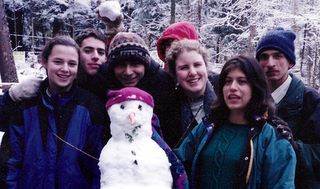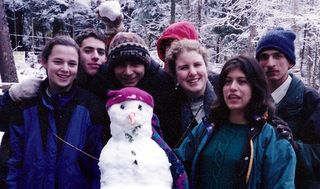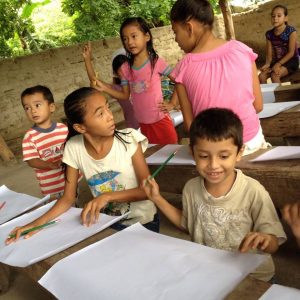Sister Cities
How Three Youth Leaders from El Salvador Changed my Life
by Jan Morrill
“Why is it that so many people in the U.S. care about the communities of El Salvador? How can they give so much and expect nothing in return?” I was asked this question in Chalatenango, during one of my last visits as Sister Cities El Salvador staff. This was not the first time I had heard this question, but it was the first time I responded by telling them the story of everything my sister community has given and taught me.
In 2002, I was an average high school student from a small town in Maine. I got good grades and went to the movies and the mall with my friends on the weekends. I didn’t know what free trade or neoliberalism meant and I couldn’t locate El Salvador on a map. I had been taught by the educational system that my role was to read and listen, not to analyze, criticize or fight for social change. It never occurred to me that there was something I could contribute to my community or to society as a whole.
That year, the youth group working with the Bangor-Carasque Sister City Project brought three youth leaders from El Salvador to Maine. When I met the Salvadoran youth in Bangor I was blown away by their enthusiasm, eloquence and leadership. They were my age or a little older, and yet they were organizing their communities and fighting for social and economic justice in their country.  Many of us can remember the moment when El Salvador first came into our lives and changed us, and for me the visit of these three inspiring youth leaders from my sister community was that moment. I began to realize that I could organize in my community even though I was only 17.
Many of us can remember the moment when El Salvador first came into our lives and changed us, and for me the visit of these three inspiring youth leaders from my sister community was that moment. I began to realize that I could organize in my community even though I was only 17.
I became very active in the Bangor-Carasque Sister City Project, and the advocacy campaigns of Power in Community Alliances (the sister city project’s parent organization). I began working with PICA to advocate for a state-wide law banning the state government from purchasing goods made in sweatshops. I was put in charge of lobbying my Republican state representative. We invited him to attend a community meeting which I led, and he ended up being one of the key Republicans whose votes helped pass the bill. This bill was the first state-wide anti-sweatshop law in the country.
This is what our sister communities in El Salvador give us. Our sister communities teach us how to organize at a local, regional and national level, and give us the inspiration necessary to start demanding and making the changes we want to see in our communities and our world.
Over the years the Sister Cities network has continued to encourage me to lead and grow. The network guided me from being an active member of a local committee, to a volunteer in El Salvador, to a board member at only 20 years old, and finally to a staff person working on the ground with CRIPDES and our sister communities in El Salvador.
I have learned so much as a result of being part of U.S. El Salvador Sister Cities: from the nuts and bolts of community organizing, congressional lobbying and project administration to an encyclopedic knowledge of mining in El Salvador (and Salvadoran slang). But most importantly I have learned that we can all contribute to work for change. As Salvadorans say, social justice work is el trabajo de hormigas, the work of ants, with each of us making our small contribution to the larger project of creating a just and peaceful world. And that’s why I am committed, like so many of you, to being a part of the U.S.-El Salvador Sister Cities Network for the rest of my life.
I would like to encourage you to think today about your experiences in El Salvador and as part of our Sister Cities network. How have these experiences changed you? How might visiting a sister community or participating in a committee change the youth and adults in your community? There are new youth in Madison, Cambridge and other committees in our network that are becoming inspired and active, and will need Sister Cities to do for them what it has done for me.
In the past six months, our network has hosted five delegations to El Salvador, including two youth delegations and one delegation of teachers. In October, we held our annual National Gathering in Madison, WI and visited committees and universities throughout the Midwest as part of our speaking tour. Our network also stepped up in response to the tropical storm that hit El Salvador, sending generous donations to CRIPDES flood relief efforts and statements of solidarity to sister communities.
But the amazing work of our network is at risk. Without your support, we will need to cut a number of important programs next year due to a serious budget deficit. The economic recession has hit our network hard this year, with fewer individual donations and delegations to El Salvador. Without more donations to fill this budgetary gap, we will have to reduce the time and resources staff spend visiting communities, supporting community-committee communication and working on our human rights and mining resistance advocacy programs.
Thank you in advance for your support and for the solidarity you have shown to the Salvadoran people for these past 25 years.
En solidaridad,
Jan Morrill
Former Sister Cities El Salvador Staff
International Solidarity Coordinator with the Salvadoran Anti-Mining Movement


